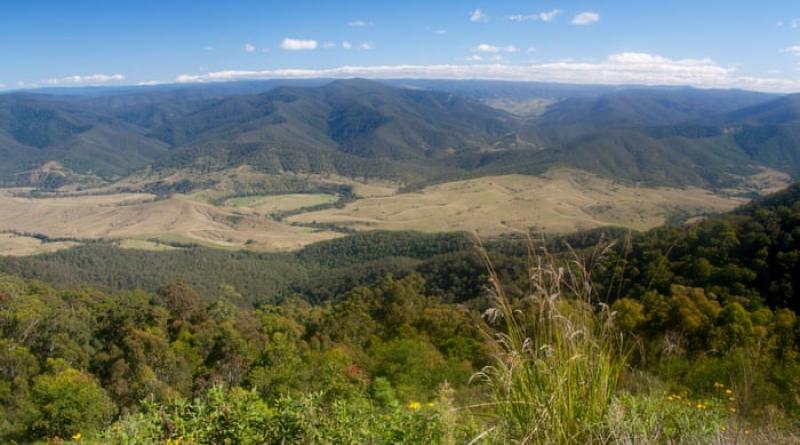Court rules out Hunter Valley coalmine on climate change grounds

Judge rejects Rocky Hill mine near Gloucester, NSW, because of its impact on the town and ‘dire consequences’ of increasing emissions.
The controversial Rocky Hill coalmine in the Hunter Valley will not go ahead after a landmark ruling in the land and environment court on Friday that cited the impact it would have had on climate change.
Chief judge Brian Preston dismissed an appeal by Gloucester Resources, which was seeking to overturn a New South Wales government decision to reject an open-cut mine because of its impact on the town of Gloucester, north of Newcastle.
The EDO joined the case last April, arguing on behalf of its client, Groundswell Gloucester, that the mine’s detrimental impact on climate change and on the social fabric of the town should be considered as part of the merit appeal.
David Morris, the chief executive of EDO NSW, called the decision “momentous” and said it would be “profoundly influential” in the approval of future fossil fuel projects.
“It’s very difficult to see how any future coal project avoids the judge’s finding about this being the wrong time for it,” he said.
In his judgment, Preston explicitly cited the project’s potential impact on climate change, writing that an open-cut coalmine in the Gloucester Valley “would be in the wrong place at the wrong time”.
“Wrong place because an open cut coal mine in this scenic and cultural landscape, proximate to many people’s homes and farms, will cause significant planning, amenity, visual and social impacts,” he wrote.
“Wrong time because the GHG [greenhouse gas] emissions of the coal mine and its coal product will increase global total concentrations of GHGs at a time when what is now urgently needed, in order to meet generally agreed climate targets, is a rapid and deep decrease in GHG emissions. These dire consequences should be avoided. The project should be refused.”
In a “first of its kind” hearing, the EDO had argued that the mine should be refused in part because of its impact on Australia’s commitments to the Paris climate agreement.
In his judgment, Preston noted that while there was “no proscription” on the approval of new emissions sources such as coalmines under the agreement, approval of the project “cannot assist in achieving the rapid and deep reductions in GHG emissions that are necessary” to meet the goals of the agreement.
“It matters not that the aggregate of the project’s greenhouse gas emissions may represent a small fraction of the global total”, he said.
“The global problem of climate change needs to be addressed by multiple local actions to mitigate emissions by sources and remove greenhouse gases by sinks.”
He rejected GRL’s argument that the project should be allowed because emissions from the mine would be abated by other emissions reductions schemes as “speculative and hypothetical”.
“There is no evidence before the court of any specific and certain action to ‘net out’ the GHG emissions of the project,” he wrote in his judgment.
“A consent authority cannot rationally approve a development that is likely to have some identified environmental impact on the theoretical possibility that the environmental impact will be mitigated or offset by some unspecified and uncertain action at some unspecified and uncertain time in the future.”
The judgment also rejected the mine on the grounds of its visual impact and the social impact of factors such as dust and noise on the surrounding community.
Morris said the ramifications would be felt by state and federal ministers and other decision makers who assess fossil fuel projects.
“This is necessarily a case-specific judgment. It relates to this coalmine proposed in the Gloucester Valley,” Morris said. “It is persuasive, influential but it is not binding on any future decision.
“But it will weigh heavily on the minds of decision makers.”
He said the judge’s comment that the mine was being proposed at the “wrong time” was “applicable to every fossil fuel project that’s proposed in this country and internationally going forward.”
Morris said Australia was increasingly approaching a moment when approval of a fossil fuel project could be considered “unreasonable”.
“And unreasonableness is a ground of legal challenge,” he said.
Climate Council chief executive Amanda McKenzie also welcomed the decision.
“The NSW Land and Environment court has effectively ruled that coal – just like tobacco and asbestos – is bad for us,” McKenzie said.
“I’m thrilled to see the law catching up with the science.
“If I was proposing to build a coal mine right now, I’d be feeling pretty nervous.”
NSW planning minister Anthony Roberts was asked for the government’s reaction to the court’s decision.
“That is the legal process and we respect the court’s decision,” he said.
A spokesman for the NSW planning and environment department said the department was pleased the court had agreed with its recommendation on the proposed coal mine. He said the decision supported the current process of assessing developments on a case-by-case basis.
In 2017, the independent planning commission rejected the mine because of its proximity to the town of Gloucester, its visual impact, and contravention of the city’s zoning plans.
“The judgment confirms the Department of Planning and Environment was correct in its decision to recommend refusal of the application to the Independent Planning Commission, and the Commission was correct to refuse the application,” the spokesman said.
“This decision shows NSW has a robust and transparent planning process that is delivering the best outcomes for the whole community.”
7 February 2019
Michael McGowan, Lisa Cox





